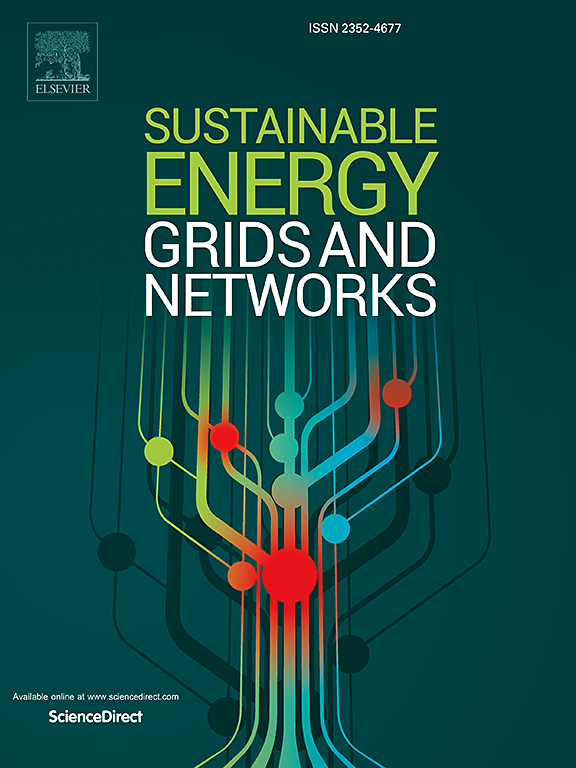Coordinated routing optimization and charging scheduling in a multiple-charging station system: A strategic bilevel multi-objective programming
IF 4.8
2区 工程技术
Q2 ENERGY & FUELS
引用次数: 0
Abstract
Effectively managing EV charging queues not only alleviates traffic congestion in high-demand areas but also improves user satisfaction by minimizing waiting times. This framework enhances overall system efficiency by better distributing the concentration of EVs during peak periods. This research investigates collaborative mechanisms from the perspectives of various stakeholders, including charging stations (CSs) and EVs, to optimize the charging process. A route optimization model is employed to direct EVs toward the most suitable CSs, followed by the introduction of two scheduling models: (1) a social welfare maximization model and (2) a game-theoretic iterative framework. These models aim to optimize EV charging locations while increasing CS profitability. EVs scheduling is performed using a mixed-integer non-linear programming (MINLP) approach, offering critical insights into its applicability across different scenarios. The numerical results demonstrate that coordinated EV scheduling substantially enhances the operational efficiency of E-mobility systems in both centralized and decentralized configurations. Compared to uncoordinated scheduling, total profits for CSs are 42 % higher for Test System 1 and 39 % higher for Test System 2. EV owners’ costs decrease by 47 % in the social welfare model and 32 % in the game-based model for Test System 1. In Test System 2, cost reductions are 12 % and 7 % for the social welfare and game-based models, respectively. Although power transactions with the market are slightly higher in the social welfare model, the game-based model demonstrates a more efficient distribution of EVs across charging stations, especially in Test System 2, resulting in a more balanced system and optimized resource allocation.
有效管理电动汽车充电队列不仅能缓解高需求地区的交通拥堵,还能通过尽量缩短等待时间提高用户满意度。这一框架通过在高峰期更好地分配电动汽车的集中,提高了整体系统效率。本研究从充电站(CS)和电动汽车等各利益相关方的角度出发,研究了优化充电过程的协作机制。研究采用了一个路线优化模型来引导电动汽车驶向最合适的 CS,随后引入了两个调度模型:(1)社会福利最大化模型和(2)博弈论迭代框架。这些模型旨在优化电动汽车充电地点,同时提高 CS 的盈利能力。电动汽车调度采用混合整数非线性编程(MINLP)方法,为其在不同场景下的适用性提供了重要见解。数值结果表明,无论是集中式还是分散式配置,协调的电动汽车调度都能大幅提高电动汽车系统的运行效率。与非协调调度相比,CS 的总利润在测试系统 1 中提高了 42%,在测试系统 2 中提高了 39%。在社会福利模型中,电动汽车所有者的成本在测试系统 1 中降低了 47%,在基于游戏的模型中降低了 32%。在测试系统 2 中,社会福利模式和游戏模式的成本分别降低了 12% 和 7%。虽然在社会福利模型中,与市场的电力交易略高,但基于博弈的模型表明,电动汽车在充电站的分布更有效,尤其是在测试系统 2 中,从而使系统更平衡,资源配置更优化。
本文章由计算机程序翻译,如有差异,请以英文原文为准。
求助全文
约1分钟内获得全文
求助全文
来源期刊

Sustainable Energy Grids & Networks
Energy-Energy Engineering and Power Technology
CiteScore
7.90
自引率
13.00%
发文量
206
审稿时长
49 days
期刊介绍:
Sustainable Energy, Grids and Networks (SEGAN)is an international peer-reviewed publication for theoretical and applied research dealing with energy, information grids and power networks, including smart grids from super to micro grid scales. SEGAN welcomes papers describing fundamental advances in mathematical, statistical or computational methods with application to power and energy systems, as well as papers on applications, computation and modeling in the areas of electrical and energy systems with coupled information and communication technologies.
 求助内容:
求助内容: 应助结果提醒方式:
应助结果提醒方式:


